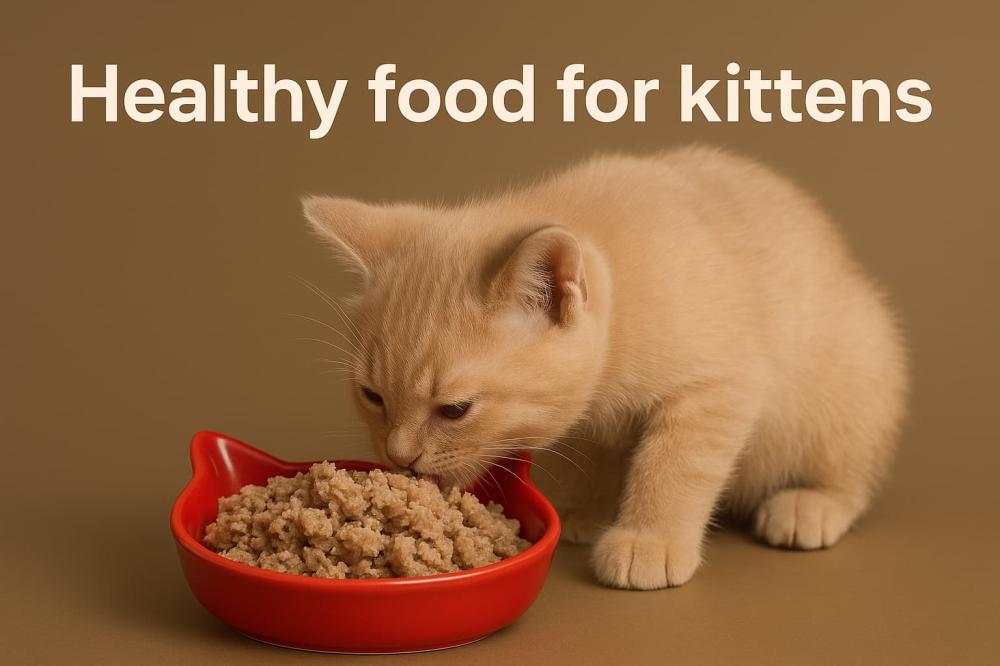Welcoming a kitten into your home is an experience filled with joy and excitement. As a responsible owner, one of the most important decisions you make is choosing the right diet for your cat during this vital stage of development. In the first months of their lives, kittens need special nutrition to support their rapid growth, strengthen their immunity, and enhance their overall health.
That's why it's essential to provide a healthy diet for kittens . Unlike adult cats, kittens need higher amounts of protein, fat, vitamins, and minerals to build strong muscles, bones, and organs.
In this article, we'll review the essential ingredients that make food healthy for kittens and help you choose the best one to give your cat a strong start to a healthy and happy life.
Best food for kittens
Choosing the best food for kittens means balancing ingredient quality, nutritional integrity, and cat acceptance. During their early stages of growth, kittens need meals rich in animal protein, healthy fats, and other nutrients.
It is always best to choose products that are labeled "kitten food" or "for growth and development" because these formulas provide the nutrients cats need at this age.
It's also a good idea to choose grain-free, protein-rich varieties that don't contain artificial ingredients, added colors, or flavors.
Best homemade foods for kittens
If you prefer to feed your kitten natural, homemade food, you can prepare healthy meals for them, but you must ensure that they meet their specific nutritional needs exactly.
Here are some suitable options:
- Boiled chicken or turkey (boneless and skinless) : An excellent source of protein.
- Boiled or scrambled eggs : Rich in amino acids and healthy fats.
- Boiled pumpkin without additives : aids digestion and contains beneficial fiber.
- Well-cooked salmon (boneless) : Rich in omega-3 acids, essential for brain and coat health.
- Rice or oats in small quantities : a light and easily digestible source of carbohydrates.
Avoid using any spices, onions, garlic, or added fats when preparing meals. It is always best to prepare food fresh and serve it under veterinary supervision to ensure a complete nutritional balance.
These meals can be a supplement to commercial food intended for kittens, but it is not recommended to rely on them completely without guidance from a specialist.
How to feed kittens
The way food is presented is just as important as its quality. To get the most out of healthy food, here are some important tips:
- Offer small, frequent meals : Because kittens have small stomachs and are very active.
- Use flat plates : to make eating easier and reduce pressure on the whiskers.
- Serve food at room temperature : it is most appealing in terms of aroma and taste.
- Provide clean water at all times : especially if you are feeding dry food.
- Clean eating utensils daily : to avoid bacteria growth.
A regular routine with good nutrition helps build healthy eating habits from an early age.
Foods forbidden for kittens
In addition to providing healthy food, it is important to know which foods may be dangerous for kittens:
- Onions and garlic : cause damage to blood cells.
- Chocolate and caffeine : toxic substances that affect the heart and nervous system.
- Dairy products : May cause diarrhea because most cats cannot digest lactose.
- Raw meat, eggs, or fish : May contain harmful bacteria such as salmonella.
- Bones or excess fat : May lead to choking or digestive problems.
- Grapes and raisins : May cause kidney failure.
- Raw dough or alcohol : Even small amounts of either are highly toxic.
Sticking to a food specifically formulated for cats is always the safest choice.
Trappy Bites Best Cat Food
From a trusted brand in Saudi Arabia, Trappy Bites is a great choice for providing high-quality, balanced food.
Their recipes feature over 80% pure natural meat, providing an excellent protein content that supports healthy growth. They also use food-grade ingredients and avoid any artificial additives.
Whether your cat is young or senior, Trappy Bites offers options tailored to their energy and health needs.
Frequently asked questions about feeding kittens
How do I make a food schedule for cats?
Start by feeding your cat based on its age, weight, and activity level. Kittens need 3–4 meals per day, while adults usually need two meals. Stick to regular feeding schedules and consult your veterinarian to determine the appropriate amount.
How do I make my cat grow faster?
Feed her a healthy diet rich in protein, fat, DHA, and calcium. Provide multiple meals, keep her hydrated, reduce stress, and schedule regular doctor visits.
How much do cats need to eat?
Depending on age, activity level, and breed, kittens should eat 3 to 4 small meals per day. Follow package directions or consult your veterinarian.
What is the feeding schedule for kittens?
- From 0–4 weeks: Bottle feeding every two or three hours.
- From 4–8 weeks: with 4 meals per day.
- From 2–6 months: 3–4 meals per day.
- From 6 months to 1 year: Move to 2–3 meals.
Regularity and good nutrition are the foundation of healthy growth.

